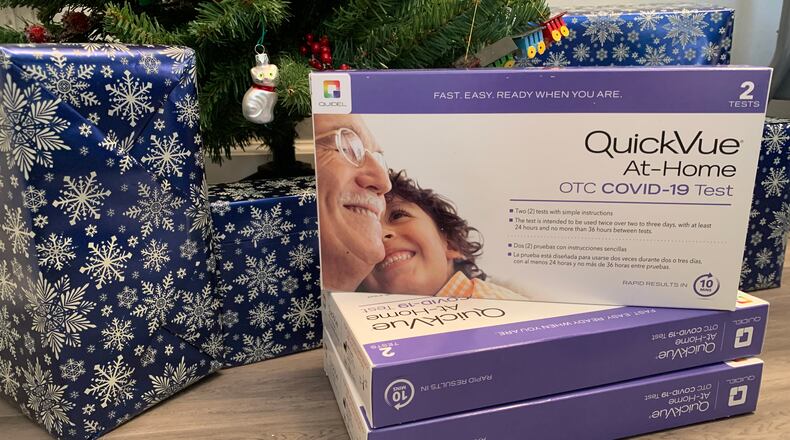“There is now consistent evidence that omicron is spreading significantly faster than the delta variant. And it’s more likely that people who have been vaccinated or have recovered from COVID-19 could be infected or reinfected,” he said. “All of us want to spend time with friends and family. All of us want to get back to normal … But an event canceled is better than a life canceled.”
An onslaught of troubling coronavirus news has come out in recent days. Omicron is now the dominant variant of coronavirus in the U.S., accounting for 73% of new infections last week, up from 13% the previous week, the Centers for Disease Control and Prevention said Monday. The variant is likely at least three times more transmissible than previous variants and chances of somebody who was previously infected with COVID-19 getting reinfected with omicron are at least five-fold higher than with delta.
At the same time, immunity from vaccines and infections are waning over time. Both Moderna and Pfizer booster shots have demonstrated effectiveness against omicron. About 21% of Ohioans have had a booster shot or third dose.
Ohio now has the highest daily average of any state for coronavirus hospitalizations, according to the New York Times. On Wednesday, 4,778 patients were hospitalized with COVID-19 across the state, rivaling numbers not seen since last December. The state reported 12,864 cases Wednesday, another record high since the pandemic began.
Dayton experts weigh in
Dr. Joseph P. Allen of Premier Health Family Care of Vandalia said he concurs with Dr. Anthony Fauci, the country’s top infectious disease expert, that it is still generally safe for Americans who are fully vaccinated against COVID (and hopefully boosted) to gather with family and friends for the holidays.
“The risk assessment is tough because COVID does affect some people more than others,” Allens said. “But I think generally speaking, if you’re immunized, it’s relatively safe, certainly if everybody of age in the whole family is immunized, then it’s safe to get together.”
But families don’t all look the same and have nuanced differences. Not every member of a family may be vaccinated, including the youngest children who can’t get shots yet, while some older or immunocompromised kin would be at greater risk if they contract COVID-19.
Sara Paton, an epidemiology professor at Wright State University, encouraged families to look at the recent COVID data, assess their own vulnerabilities, and reevaluate whether to gather and what precautions to take.
“I think about the most at-risk person in my group, what’s safest for them? Because they’re the ones you want to protect the most at your gathering,” she said. “Let’s say it’s grandpa or grandma. Have they been vaccinated? Are they immunocompromised? It’s going to be a different scenario for different get-togethers. If you’re fully vaccinated and boosted, I would keep my gatherings small, but I would still probably have them because there’s a cost to not having our gettogethers, too.”
It’s safe to say omicron is more transmissible than previous COVID-19 variants, Paton said, but it’s difficult at this point to determine whether it will cause more or less severe disease.
“Even if it is less severe, and a smaller percent may go to the hospital, there’s going to be a whole lot more people with it because it’s so transmissible, so it could overwhelm hospitals just because of the volume of cases,” she said.
Paton and Allen suggested using masks, opening windows and taking rapid tests to make gatherings a bit safer. Allen suggested discussing expectations and establishing boundaries before a party or gathering.
“It’s a conversation probably worthwhile to have before you’re going to visit,” he said.
By the numbers
- 73% of new COVID-19 infections last week were the omicron variant.
- 3 times: Omicron is at least three times more transmissible than the Delta variant.
- 5 times: those previously infected with COVID are over 5 times as likely to be reinfected with omicron compared to delta.
- 12,864 cases reported in Ohio on Wednesday
- 4,778 Ohioans hospitalized with COVID-19 on Wednesday.
- 502 coronavirus deaths in Ohio so far this month.
- 41% of Ohioans are unvaccinated.
- 21% of Ohioans have received their booster or an additional dose.
Tips for safer gatherings amid COVID-19 surge:
- If you are feeling sick or test positive for COVID-19, stay home and do not attend gatherings.
- Get your COVID-19 vaccine and booster shots if you are eligible.
- Make plans for gathering based on the most at-risk person who will be present.
- Communicate expectations with guests ahead of time.
- If you can get your hands on in-home COVID-19 rapid tests, everyone attending a gathering should take the test the same day you plan to spend time together.
- When interacting with family members who are immunocompromised or high-risk, wear quality face masks.
- It might be too cold in Ohio to hold a gathering outside, but if you’re traveling somewhere warmer, suggest having the party outdoors to cutdown on possible transmission.
- Open windows and doors, especially in the rooms where people are gathering, to increase ventilation and air flow, thus making transmission less likely.

